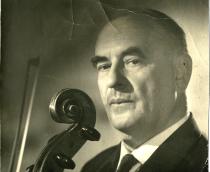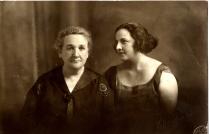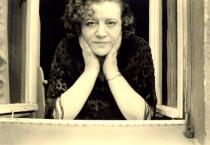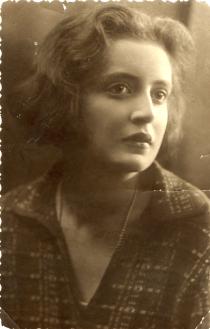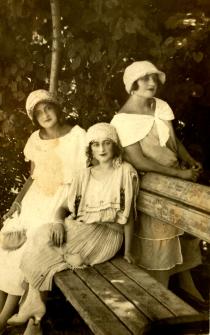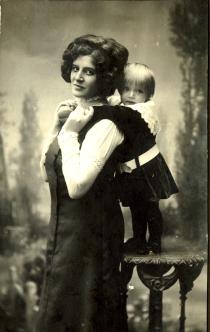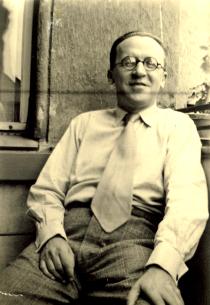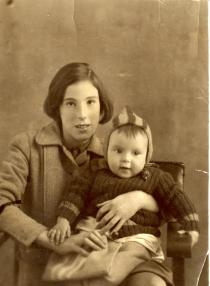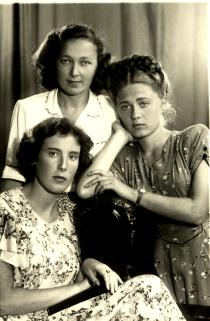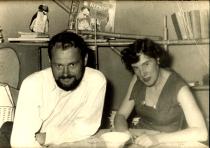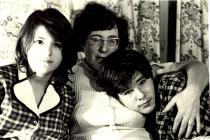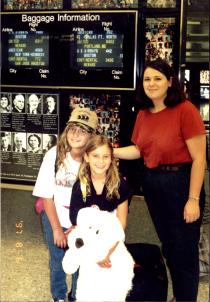
Ukraine
I am Asta Grigorievna Pekker. I’m 72 years old. I was born in Berlin, in June 1929. I lived there for four and a half years. My parents and my grandfather and grandmother were Soviet citizens. With Hitler coming in 1933 the Soviet government called our family to Moscow at the end of the year. My grandfather, my mother’s father, Pyotr Borisovich Shwartzman, was director of a Soviet-German oil company from 1927 to 1933. He worked in Berlin on behalf of the Soviet government. My grandfather’s life story was very interesting.
He was born in Warsaw, some time in early 1880s. His family must have been quite well off to give the boy Jewish and secular education. He finished high school and two departments at the Warsaw University. In 1905 he was expelled from University for participation in students’ disorders. He spent in prison in Warsaw for some time. According to the family legend he was staying there with a man, quite young at the time, he didn’t know his name, but he knew his nickname. He was called Long. Later on it turned out that this was Felix Dzerzhinskiy, who further on became my grandfather’s guarantor for all Soviet positions that he held.
In 1907 or 1908 my grandfather Pyotr Borisovich Shwartzman left Warsaw for Petersburg taking with him or kidnapping, according to the family legend, Yelizaveta Lanee, his fiancée, future wife and my grandmother. In Petersburg he graduated from legal and engineering departments at University. At 32 he knew nine languages being an outstanding specialist in the sphere of jurisprudence and oil industry. The newly weds Pekkers lived in Moscow, Petersburg and then Odessa. My grandfather was working at the Russian affiliate of the Nobel Company. During the Soviet period he, who by the way had never been a communist, was on high official posts. In 1925 or 26 he became director of a Russian-German oil company in Berlin.
My grandmother Yelizaveta Osipovna Lanee, was several yeas younger than my grandfather. At a time she was one of the most beautiful girls in Warsaw. Hers was a well-off orthodox Jewish family, and I believe, there was some kinship with the Brodskiys, well-known manufacturers. Her father and three brothers had tanneries and leather goods stores in Mongolia, Russia and Europe. According to the family legend, there also was a French branch in my grandmother’s family. Her family name – Lanee, is another proof of it. In her childhood my grandmother received Jewish education at home, and then she went to high school, and that was an end of her studies. She was beloved wife and mother for the rest of her life. She had two children, and the older one was my mother.
I remember my granny Lisa. I loved her dearly. I remember her when she was about 50, and she was still very beautiful. I didn’t meet anyone from her family. As for my grandfather’s (Pyotr Borisovich Shwartzman) family, we only had a picture of his mother, my great grandmother, whose name I cannot remember, unfortunately, and of his sister Rosa Shwartzman.
Grandfather Pyotr and grandmother Lisa played a huge role in my upbringing before and after the war. I always called my grandfather “Papa Petia”. It became a habit in our family to call him thus. They called their older daughter, my mother, Selena. They say, my intelligent grandmother was engrossed in Senkevich, a Polish writer, novels, and from there I learned that Maria Magdalena, the heroine of Testaments, was called Selena before she was baptized. My grandmother got so impressed by this name that she called her first daughter, my mother, Selena against any Jewish tradition. My mother was born in Warsaw in 1908. I don’t know whether she got any Jewish education, but most likely, she didn’t. It may have been high school. Then she finished Stanislavskiy theatrical studio at the Moscow Art Theater. She was an actress in this studio before her marriage. In 1925 my grandfather received an assignment in Berlin and he took his family there: my grandmother, my mother and my future father - my mother’s husband (by then my parents were already married) Grigoriy Pekker, violoncellist. In Berlin they lived for almost nine years and that was one of the brightest and most peaceful periods in the life of our family. My grandfather was working; my future father was finishing the Berlin Conservatory, My mother didn’t work with grandmother were enjoying life, reading a lot.. By the way, they spoke German at home, therefore, this language became my mother tongue.
According to my mother’s stories, the family did not have a feeling of their Jewish status before 1930-31. However, in the thirties the situation changed dramatically. They talked a lot about Hitler and his policy at that time, but in 1931 or 32 my mother met him almost in person. My grandfather, being a member of Diplomatic Corps, was invited to watch some closed film. He took his daughter – my mother – with him. Getting through the dressed up crowd in the cinema they bumped into a man that was one single person who didn’t step aside to let mother pass. After they took their seats grandfather Pyotr said to my mother: Do you know who this was? It was Adolph Hitler, a political carper-bagger”. At the beginning on 1933 my mother saw a Jewish store looted. The people were running away in fear. Mama did not keep quiet and was taken by the police. She said it was a disgrace on an international level and that she was a Jewish, too. The policeman looked into her passport and said very politely that meanwhile they were not interested in the nationality of foreigners.
When in few months the Soviet government started calling back their citizens from the fascist Germany many people never went back to the Soviet country. Our family returned because my mother insisted on it. Mama said then that she wanted to live in the country where they wouldn’t remind her that she was a Jew. I didn’t want to leave Germany, I was four and a half years old, and I had many friends and a wonderful German nanny Lizhen. From her I got pure Berlin pronunciation in the German language. My papa, a world known violoncellist Grigoriy Pekker, couldn’t leave Berlin for Moscow either – he actively went on tours in Europe in 1930-33. He even toured Japan. He was the first Soviet performer of music there. It is interesting that when the question of departure turned up, he received employment proposal from various musical communities. He even got such invitations from Australia. He never and nowhere felt anti-Semitic. It was very talented musician and to him always and everywhere much well pertained. (In Germany he after 1933 anymore was be). It happened so that early thirties became a peak of my Papa’s foreign artistic carrier.
My father Grigoriy Pekker was born in 1905 in the town of Yekaterinoslav, Dnepropetrovsk at present. He was the thirteenth child in the family. His parents’ – Illia Pekker and Daria Pekker - children became musicians. They were musicians themselves. They organized a real and maybe the first family orchestra in the vicinity of Dnepropetrovsk (Yekaterinoslav) some time around the fifties or sixties. Not only the children, but also their Mama and Papa (i.e. my grandfather and grandmother) played the violin. And the children were taught to play the instruments, that were needed in the orchestra. After this musical family moved from their town to Dnepropetrovsk they even played professionally in the local movie theater. That was when composer Glazunov heard them playing when he was traveling through Dnepropetrovsk. He took two of them – Papa’s elder brother, contrabass player, and Papa, a very young violoncellist, just a beginner – to Petersburg, brought them up and educated on his own money. Subsequently almost the whole family, i.e., this whole orchestra found themselves in Petersburg, and Glazunov, who was Director of Petersburg Conservatory, helped them in every possible way. Papa got lucky in the early Soviet period in the same way. In the 20ies Lunacharskiy noticed the young musician Grigoriy Pekker and sent him to study in Leipzig from the Soviet government. We still have Papa’s correspondence with Lunacharskiy at home. That was how the orthodox Jewish family of my Papa wandered off into the world gradually. The musical life of the family orchestra also ended. Some time in the 16th or 17th his brother, a contrabass player went to the United States of America, the rest of them went off to various places and they never again got together. In 1942 my grandfather Illia Pekker and my grandmother perished in the blockade of Leningrad.
My Papa could come back to Moscow, Russia, from abroad only by 1953. That was the end of his carrier abroad. Since then he worked as professor in various conservatories in the Soviet Union. I from childhood pa and its friend taught a play on pianoforte as cellos, but I always liked to listen a music, rather then play. I dreamed be writer.
So, at the end of 1933 my grandfather, myself and my grandmother Daria went to Moscow. Mama stayed in Berlin for two years waiting for Papa. I came to Moscow as a real German who hardly knew Russian. They started teasing me so, calling me a fascist that I forgot all my German in such a short time that in the fifth grade I started learning it almost anew. Children often teased me for my strange name – Asta. I got it from my mother, in the same way that she got her name I was called after the famous Norwegian actress Asta Nilsen. But a month before I was born Mama of my grandfather Pyotr Shwartzman died. I do not remember her full name, but it started with an A and probably sounded like Asta. I would like to say that in our family the Jewish tradition of giving a name was followed very strictly but in a different way. They never gave a name of a living close relative.
I went to school in Moscow in 1936, and my second form was in Kiev. We actually ran away to Kiev from Moscow in 1937. With the beginning of intensive repressions people started avoiding as the ones who had been ling abroad for a long time. We could go to where we were not known. Nikita Sergeyevich Khruschov, the future leader of the Soviet Union, but at that time a big admirer of my Mama, suggested that our family moved to Kiev, where he was also transferred at that time. We gratefully accepted this invitation. Papa became a senior lecturer at the Kiev Conservatory, one of the youngest, and grandfather Pyotr and grandmother Lisa stayed in Moscow. They said in our family that only by miracle the grandfather avoided repressions of 1937, and that very likely Mikoyan had helped him. My grandfather worked with him since 1935 when he was in Berlin. According to the legend, Mikoyan was the only statesman who managed to keep all his personnel during those years. My grandfather quit quietly all his official positions, and he lived and worked as if in a shadow until very old age. By the way, I didn’t know, until I was twenty, that my grandfather Pyotr Shwartzman knew seven languages: Russian, Ukrainian, Polish, German, French, Spanish and including Hebrew.
Mama, Papa and I found ourselves in a marvelous home in Kiev. We had three rooms in Gorkiy Street, but still it was a communal apartment. Besides us, there were two other families, but we were the only Jewish family.
To me, a ten-year old girl, Kiev was no different from Moscow or from Berlin, as it was. I was well anywhere, I was loved. I felt myself independent in Kiev. In 1941 I went on my first unaccompanied voyage in the city. On that day my sister Zhenia was born. Papa, caring about Mama’s health, did not allow her to give birth at a Soviet maternity home. He arranged everything at home. A famous professor attended to Mama, and I was sent out for a walk. They even didn’t send our housemaid Polina with me. On coming back home I was told that I had a sister and I couldn’t believe such happiness. I need to say that by that time I had two clear wishes: number one – I wanted a sister or a brother, and number two – I was eager to become a writer. I can hardly remember my school in Kiev before the war. I must have entered the pioneer organization. They must have taught me the Ukrainian language. But I don’t remember it. The Ukrainian language was introduced to me through our neighbors, a wonderful Ukrainian family of Yurchenko. The head of this family was a famous architect, specialist in wooden architecture of Ukraine. The Yiddish language was far from us at that time as well as identification of ourselves as Jewish. Mama’s hope that she would be living in the country where nothing reminded her of her Jewish origin had come very true until 1941.
I became fully aware of my being Jewish during my stay in Alma-Ata in the evacuation. I heard the word “zhyd” for the first time in Moscow on 28 June 1941, but then I, almost a twelve year old girl, didn’t know what it meant. I heard it from a Russian worker, who called me this way, so I immediately ran to my grandmother to ask her what it meant and who I was. Grandfather and grandmother explained to me that zhyd was a very bad word and that this was the word that they called people of certain nationality – Jewish, and that we were Jewish. This was new to me. And then, in 1941, before the war, when I was twelve, I still lived a life in books (we had lots of books at our home in Kiev, this were books on beautiful distant countries, journeys, about the beautiful love and friendship). We had records, a record-player and a wireless that we had brought from Germany (this was a rarity), and in the music that was constantly played at home. (Papa had a number of students coming to him). And at that time any national or political problems were none of my concern. However strange it may seem, I cannot remember any discussions about fascists and their attitude towards Jewish people at our home before the war. There may have been such but not in my presence. I was living like in a fairyland in my own (a rare thing at that time!) room with the blue walls and white children’s furniture from Berlin.
It was next to impossible to imagine anything like that in Kiev in the forties. I was on guard of this world of my own, and rarely invited friends there. I didn’t feel comfortable telling them that my Papa was Professor – the others didn’t have one. A week before the war my grandfather came to Kiev from Moscow. It was him who took me to Moscow on 24 June 1941, as far from the war as possible, as it seemed to him. That was the end of my happy - the happiest childhood, with only brightness and love in it, where I never heard anyone raising his voice at somebody else or saying an angry word. The war started changing everything in our life. First in Kiev and then in Moscow I soon got used to raids. It’s strange, but it seems to me that children were not afraid of them that much. Lack of sleep and the growing lack of food were much worse. By the end of June Mama came to Moscow with my little sister. We didn’t know where Papa was.
In August they started evacuating children from Moscow. We evacuated to Gorkiy to our relatives and my grandfather stayed in Moscow. We were taken to Gorkiy on pleasure cruise barges along the Volga. Somewhere on the way we got stuck in the sluices and were bombarded by German bombers. Mama and I and Zhenechka were on one barge and my grandmother, her sister and an acquaintance were on another. We spent a night in this bombardment. I dozed off on Mama’s knees and when I woke up in the morning I saw that her hair, the hair of a thirty five year old woman, turned completely gray. Mama saw six barges of ten drowning. In Gorkiy, I remember, the adults and children lost their last illusions about prompt ending of the war. Along with these illusions crashing our irrepressible hatred towards the Germans was growing. In some time Papa came to Gorkiy. He was moving museums from Kiev – they were evacuated to Kuibyshev, and Gorkiy was on the way there. Papa managed to evacuate from Kiev in September, almost right before Germans came there. In Gorkiy we didn’t know anything about what Germans did to Jews in Kiev. Basically, we knew practically nothing about what they were doing on the occupied land for a long time. I remember crowds of people going to military enlistment offices to go to the front as volunteers. Later I learned that there were many Jews among them. Although it still made no difference then, but there was already a harsh anti Jewish trace of watchfulness in the air.
It was just a miracle that Papa found us in Gorkiy. It was also a miracle that he could bring his violoncello, the famous Amati, the violoncello of the USSR State Collection Fund, with him.
Front was moved towards closer and us evacuated further, in the july 1941 we were going to Kuibyshev all together, with Papa and with our housemaid Polia, who traveled with us from Kiev. And then we got to Alma-Ata from Kuibyshev. We arrived in Alma-Ata late in the fall of 1941. We rented an 11 meters room where 14 people living there by the concourse of circumstances. Fortunately, we managed to bring some things and Mama’s jewelry from Kiev. This helped us to survive in Alma-Ata and saved us from starving to death. We rented our dwelling at the rich manor of a long time ago dispossessed Ukrainian kulaks. Everything there was meant for sale. The locals had no idea of that kind of hunger. But they knew very well who the zhydy were. And at first neither Papa nor Mama had a job, so we suffered from hunger much. I remember stealing a turnip at the market and that was such happiness. Then Papa managed to get employed by the Mosfilm orchestra that was in Alma-Ata at that time. He got a job of drum-player that was the only vacancy at the time. He worked like that for three months and then left for the conservatory that had just opened. And things became easier for us. All this time Mama was the main source of our existence. She slept three or four hours a day, and the rest of the time she was knitting clothes and selling them to get some food.
In 1942 food cards were introduced. They were of three grades: workers’, employees in office and dependants’. They gave 800 grams of bread for the worker’s card, 600 – for an employee’s in office, and 400 grams – for the dependent’s card per day. We: ma, grandmother and we with the sister were dependants’, therefore that nobody from us did not work, and only pa was belonged to categories of employees in office. Besides, there was monthly minimum of sugar, oil and cereals. To get food for the cards we had to stand day and night in endless lines, so one can say I stood in lines all my childhood in Alma-Ata.
In the middle of 1942 we received an apartment. The location was beautiful – over the mountain river Alma-Atinka. At the beginning we took water from it as there was no water supply piping in this new building. Life got a little easier if it hadn’t been for the tragedy that happened at my school. I got into a Russian class, or it would be more correct to say – Russian and Ukrainian class, and the children there came from once dispossessed kulaks’ families. The first question that my Papa and I were asked by my classmates was the question about our nationality. Papa made a big mistake – he said we were Ukrainian. When it became clear that it was not so, they started badgering me. More than once rotten tomatoes were thrown at me. I found the word “zhydovka” (female gender for zhyd – transl.) on my textbooks. Nobody talked to me for days. This badgering resulted in mу illness. I almost died. I had a severe nervous fever. Besides the doctors, my teacher and class tutor Anna Ivanovna, a 28 year old Russian woman, helped me to get out of it. Firstly, she forbade my Papa to take me to another school. Secondly, after I came back to school she told off the class and said that she would find the one who wrote those insulting things by his handwriting. In ten minutes I received a note from a boy confessing that it was his doing. I raised my hand and told the teacher that I knew who wrote “zhydovka” and that it didn’t matter any more.
From that moment I became part of them in the class. I was not only an A-student, the only one in the class, I was elected head-girl and I became the one that you can call “a Jewish buddy”. And this was even worse than that nervous fever. They told anecdotes in my presence, they swore about zhydy, they didn’t feel shy in front of me, as I was their “buddy”, as if it all did not refer to me. And I kept silent, I couldn’t say a word. Fear settled down in me since then to stay there practically for the rest of my life. All my following growing up and growing into a mature personality was marked by getting rid of the complexes gained at that time. I don’t think I got rid of them. I remember there were no other Jewish children in my class besides myself.
There were no Kazakh children either. Basically, I can hardly remember Kazakhs. One could only hear the Kazakh language or see Kazakh clothing at the market, if ever. There was an impression that it was all one big Russia. Here is the only event that I remember. Once, going back home, I got seated on the boulevard beside an amazing person. He was different. He had a big white beard and was wearing a wide-brimmed hat. Turning to me he spoke bad German as it sounded to me. I had no idea what Yiddish sounded like at that time. I told him I didn’t understand and he said that this was why we shouldn’t be respected – because we forgot our mother tongue. I remembered this for the rest of my life, although this was a single event of this sort in my life.
In Alma-Ata in the fifth form I started learning German as if anew and I liked it very much. It is strange that at that time our love of the German language and hatred of Germans lived as if in parallel and separate from each other in us, kids. Gradually our life in Alma-Ata got easier. We still didn’t know what was actually going on at the front, although political information sessions were held regularly at schools. We didn’t know anything but that the Germans were rascals. Hunger was tormenting and it was the most serious physical ordeal for me. I remember at my 13th when I was asked what I wanted for a birthday present I said I wanted a loaf of bread most of all, but in such way that there was bread for everyone else at home. Then they sold Mama’s wonderful Swiss watch and bought two loaves of bread – one for the household and one for me personally. Mama tells me that I was eating it until I fell asleep holding it in my hands.
Papa went on tours with the theater and once he returned home holding his violoncello underarm as his instrument case was filled with rice. They paid for the concert in rice. It was the feeling of unprecedented happiness.
There were many hospitals in Alma-Ata during the war time. As a rule, they were housed in schools or near schools. We took them under our patronage. All children, even my little sister, performed in front of the wounded soldiers.
At the end of 1942 we got to know that Papa’s parents, my grandfather and grandmother, died in the Leningrad blockade. Grandmother worked until her last days, she was a violinist. She died in the bombardment on her way home. Grandfather, left all alone in an empty apartment, died from hunger. Papa was so affected by this that it caused a nervous breakdown. He withdrew into himself, became silent and was hiding bread under the pillows or anywhere else. In the course of time he got cured, but he was marked by this trauma for the rest of his life. If he had to buy food he would buy too much, tens of kilos or sacks. There had to be plenty of everything in the house. That became my Papa’s idée fixe until the end of his life.
A year after we came back to the liberated Kiev. The first thing I remember is Kreschatik, ruined to the ground, and then – cakes that they were selling in Kiev streets at the end of 1943 and doughnuts with cream inside. We didn’t see once anything like that in our Alma-Ata evacuation. At the beginning we lived at the Conservatory hostel. And then we received an apartment, six rooms for Conservatory Professors and their families. That was some sort of end of the war for us. Although we only lost my Papa’s parents, but it left a trace – our wounded hearts. The hearts Kievites were wounded, too. Kievites became different people. The word “zhyd” could be heard everywhere in Kiev. And “Babiy Yar” were not pronounced at all.
At the end of 1943 I saw Germans for the first time after my childhood in Germany, but those were captive Germans, involved in the construction of Kreschatik. I also was witness of that fearful episode when few German criminals were hanged publicly in Kreschatik. I got there incidentally, and I don’t remember the faces of the hanged Germans, but I remember well the faces of people watching them. Since then and until this day I fear and panic at the sight of crowds staring at something.
I have dim memories of the Victory day in Kiev – 9 May. I have much brighter memories of the day when war with Japan ended, August 1945, and the day when they dropped a nuclear bomb on Hiroshima and Nagasaki.
In 1945 I got ill with tuberculosis all of a sudden. It interrupted my school for a year. I finished school in 1948 with silver medal and submitted documents to the Department of Journalism in University. Of course, I wasn’t accepted. It was either because of Item 5 (in Soviet passports in earl 5 was indicated national attribute) in my passport or the place of birth – Berlin. My father, who was Dean of the Orchestra Department in the Conservatory, had a discussion with Chairman of Entrance Commission. But before this misunderstanding was cleared up I decided to go to the Philosophy Department following my grandfather’s advice who said that to become a good writer one had to be a good philosopher and psychologist. That’s how I found myself a student of psychology section, Philosophy Department at Kiev University.
I was 19. Fortunately, the financial situation in our family allowed me not to work, just study. However, my mother earned some money to add to Papa’s salary. She was making wooden summer shoes together with a carpenter and selling them at the market. She was earning her living this way until around 1950.
Approximately at that time – 1948-49 postwar years, our country stepped into the period of struggle with cosmopolitism. And my father, of course, turned out to be the first and the main cosmopolitan in Ukraine. He fit in this category completely. He was a Jew, he studied and worked abroad, and perhaps the main thing at that time – he was a close and official, so to say, friend of composer Dmitriy Shostakovich (they were friendly with 20s. The Father did not be afraid to support a friendship with Shostakovich , which in that time pursued authorities. Shostakovich always on this remembered and was thanked to the father. This friendship is continued whole their life, before the most death Shostakovich in 70s, they were not only friend, as well as spiritual partners a people with one vision). It was just impossible to stand all these three items. They started pursuing him in newspapers, on the radio and at the meetings at work. Papa actually lost his profession and his job. And following him almost all Jews were dismissed from the Conservatory, and not only from there, per special, although secret, order. This was a general all-Union action. The only exception that I know of and would like to tell you, happened in Odessa with Rector of Odessa Conservatory, Ukrainian composer Konstantin Dankevich. At the beginning of 1950 he received this order and in addition to it he was given a list of the Jews to be dismissed from the Conservatory. He wrote his own name – Konstantin Dankevich - on top of the list and sent it to the Party Town Committee. Not one single Jew was fired from Odessa Conservatory then. But my father’s lot was different, unfortunately.
In 1950 he was neither Head of Department, nor Dean of the Orchestra Department at the Conservatory. It’s amazing that at that time this tragedy did not impress me that much. My father’s authority and status was too high and steadfast. It came to my conscience in full after my year students’ meeting, dedicated to cosmopolitism and condemnation of enemies of the people. My girlfriend, Jew, Yeva Reznik studied at the same course with me. Her father was arrested per this charge. During the meeting the girl fainted but nobody came to her. It was a shock for me and a turn in my conscience. Being 21 I was a real Soviet Marxist philosopher, as my mother used to put it, and I was afraid to speak. Since that time my new spiritual life started.
I was finishing the University right at the outburst of the “case of doctors” . Considering that general situation in Kiev was very tense, all Jews seemed to be preparing to be forced to move to Siberia or Birobidjan, there was less tension at our Philosophy Department. Having reacted to the case of cosmopolitans, the Department seemed to have had no reaction to the “case of doctors”. All our numerous Jewish students and lecturers remained where they were. In general, this subject was not mentioned among students not only at meetings but informal conversations as well. It may have been so because I was in a good, strong group of friends. All Jews from the University spoke only Russian. I practically heard no Yiddish at the University or at home (this was not accepted, yes and unfashionable). One could hardly hear it in the streets either. My surrounding spoke only Russian. Rarely one could hear Ukrainian, but it was village dialect and conversational. Only once in those years I met with Ukrainian intellectuals, speaking Ukrainian. In 1959 my future husband and I happened to be at the meeting of Ukrainian intellectuals-nationalists. That was where I heard for the first time about the Ukrainian idea and the real Ukrainian language. There I saw for the first time hatred to the Russians, and by the way, it didn’t extend to the Jews. And I remember the phrase that my future husband said after we left that meeting. He said that now he understood that any nationalism came from the complex of inferiority.
I graduated the University at the year of Stalin’s death. I was crying for him bitterly and sincerely (Stalin’s death was a tragedy for the whole country. Many people idolized him and couldn’t imagine their life without their “leader of all times and people” – that’s how he was called – transl.). The following political events had a great impact on my life. My friends and I had faith in the idea of communism and thought that everything that was going on in our country was right. Only with the flow of time I came to understanding that things were more complicated than I thought. Like Babiy Yar, for example. I didn’t know the truth until I read articles by Kuznetsov and Victor Nekrasov about what had happened there.
Upon graduation from the University I did not quite come to terms with science as I was attracted by literature. My eagerness and Papa’s acquaintances allowed me to get a job in the art and literature publishing house “Mystetstvo” (“Art”). There I was also learning the real Ukrainian language. I learned it so well that after working there for many years I was fired in 1965 or 66 for Ukrainian bourgeois nationalism. It’s interesting that they couldn’t fire me even for this by the Soviet law. By then I had two children. So they just asked me to leave. It was Director of this publishing house who asked me. He told me how difficult things were for him because of me. I felt sorry for him and wrote a letter of resignation. In four yeas, when I returned to polygraphy he gave me best recommendations. Of course he did! As after me there was only one Jew left in the publishing house “Mystetstvo” before 1967.
I got married in 1957. My husband Anatoliy Stepanovich Summar was an artist by education, later on an officially recognized abstract artist. Although his family was half Jewish (his mother was a Jew) we had quite an ordinary wedding. Neither his or my family were religious. We lived with our parents and when Papa was invited to Novosibirsk Conservatory (as Professor) in early 1959 and left there with Mama, we stayed alone. We were the only young couple in our surrounding who has a place of their own. Some time during these years we met Victor Nekrasov (worldwide known writer, dissident) and made friends with him. He was the very person who mentioned Babiy Yar officially in a Soviet press.
In 1961 our first child, son Pavlik, was born, and in 1964 – daughter Annushka. Our life by that time was quite stable materially and spiritually – work, a circle of friends, certain interests. And then there was an event that happened a few months before Annushka was born that sent me back to my Alma-Ata complex. Somebody pushed me in the line in a store. A woman there said that I was pregnant and that they could injure my baby. And then I heard from a half-drunk man who pushed me: “That’s good. There will be fewer zhydenyat (babies – transl.)”. My reaction was immediate and unexpected for me – I turned and hit him, I hit a human being for the first time in my life. It was astonishing but he fell – he must have been too drunk. It was also astonishing that there was dead silence around me. In this crowded store nobody blamed me but nobody supported me either.
And since then I clearly realized that being a mother and protecting my children I could kill anybody who would attempt to hurt them. Since then I also realized that I would never hide my Jewish origin. The life of my both children went under the sign of Jewish origin. But in such different way, almost in the opposite direction. The younger one, Annushka, was growing and grew independent. She generally didn’t care who she was. It didn’t make much sense to pick on her. But Pavlik, although older, was much more vulnerable. At six he asked me what zhyd meant and why the called him this way. It seems I made a mistake then telling him what it meant and how he should treat those people who said so. He wasn’t offended or scared, but I understand now that he felt himself a Jew ever since, for the rest of his short life. At 14 he committed suicide.
Pavlik was a very gifted boy – almost a genius - that was what doctors told us. He very started learning to play violoncello. We thought he would follow in his grandfather’s footsteps. And in the second form our nine year old Pavlik came home from music school with a huge word “zhyd” written on his back. He asked me then: “Mama, why don’t we go to Israel? They won’t abuse me there for my being a Jew”. I answered him with what I deeply believed in. I said to him: “Look, perhaps, I am not the best mother, but you wouldn’t give me up for anybody else?” He didn’t ask me one single question more, in his nine years he understood and subdued. At 14 he wrote a leaflet. It said that it was a disgrace to have such a nobody as Brezhnev for the leader our great country, and that it was impossible to keep silent about it. He typed five copies on our typewriter and took them to school. This was in 1975. I explained to Pavlik that he wouldn’t help anybody with this leaflet, but only ruin us all. It was the truth but it was unbearable for him. He didn’t wait for the scandal or investigation at school. He died, and he was 14 years, a half and 14 days old. They didn’t leave my boy alone even after he died. In a month after his death they broke the name plate on the cemetery with a picture of him and destroyed the flowers. Pavlik’s death rolled heavily over our life. It was a hard trauma for our 10 year old Annushka, who unfortunately was the first to take the blow. She was the first one who was told about her brother’s death. Since then Annushka never asked me the same questions that Pavlik did. She resolved them by herself on the principle of opposition.
After finishing school Annushka, being a humanitarian by nature, decided to study physics – in the last years of his life Pavlik wanted to become a physicist. And the issue of our possible emigration was also resolved for Annushka, once and forever and without being spoken up. Although we had friends and relatives all around the world by that time, she knew that her father, my husband whose mother was a Jew, papa – Bielorussian, and in his passport he was written down as Russian, didn’t want to go anywhere by the Soviet tradition. And this was resolution of all issues.
I need to say that the evolution of our views on emigration was developing as follows. Of course, since 1949 we knew about Israel and we knew that there was a formal opportunity to go there – we never had a real opportunity constitutionally. But everything going on there was as if in parallel with our life. My Jewish surrounding were the people belonging to the Russian intellectuals, with the Russian self-consciousness, brought up on the Russian literature. They unconditionally accepted the land on which they lived as their own and the only one. They had to be forced to change their mind, to have life hit them on the head to have a different orientation. It happened with some sooner, and the others haven’t come to it until this day. For some this discernment turned out to be too late. Apparently, our family fell under this category.
As I can see it now, the most characteristic periods of the postwar anti-Semitism were 1948-49, 1951-53, and 1961-64, joining the struggle with abstractionism. Then there came the hopeless, disgusting but bearable period of relative tolerance that lasted until the nineties. And in the eighties there was the first break-through of mass emigration. It was relatively easy to leave. The people were not even stopped by high enough fee that they had to pay – 2000 rubles per each leaving person with higher education. For Soviet intellectuals this was a big amount of money, but, nevertheless, there were many people leaving.
For my Papa and mama this period passed easier than for us. Since 1960 my parents were living in Novosibirsk, my father was Professor in the Conservatory and gave concerts. And anti-Semitism was much softer in the eastern and northern parts of the Soviet Union than in its central regions and particularly in Ukraine. Papa was working until the last days of his life. He died there, in Novosibirsk, in 1983, and my Mama died in 1986.
Grandparents (for mother side) after the WWII of lived in Moscow. After death of grandmother in 1953, grandfather has moved to us and died here in 1959 in Kiev.
Аbut my younger sister Zhenechka resolved this issue in a different way. Оshe lives in the United States of America for many years.
I worked in the publishing house “Naukova Dumka” (Scientific Thought – trasnl.) until my retirement. The changes that came in the nineties and are very significant, in my opinion, didn’t touch me directly. Of course, the level of freedom that we gained in the independent Ukraine, cannot be compared to the formed situation. But it didn’t change much in the root parameters of our life. It seems to me that anti-Semitism has been here in the recent years, though the factors supporting it now are different. Firstly, the Jews, unlike the others, sooner received the possibility to live the country freely and guaranteed support in the free world afterwards. Secondly, however strange, people are jealous about daily support provided to their members by Jewish organizations, Hesedov (all Jew of pension age each month get gratis products, some medicines, they help solitary and helpless.) The Jewish community in Kiev has also changed. They became more conscious and self-confident. To a big extent for the same reasons that cause anti-Semitism at present. People understand that it is safe and good to be a Jew. But the most important is that whatever happens they always have a potential possibility to leave. As for me, after mature thinking, however strange it may seem, I still believe that it is not reasonable to look for human dignity in the national roots to restore it. General human values have always been dominant for me.
My daughter Annushka married a nice man. He is Ukrainian, his name is Vassiliy Zarya. I have two granddaughters: Katienka and Lenochka, Lusenka. They have almost grown up, they know a lot, they can do a lot and they have seen the world. Katyusha reminds me of Pavlik. I pray that his destiny never catches my grandchildren in any way. Most of all I would like them to live in a normal free society. It would be good if it were on the other side of the globe, but not here. It seems to me that Holocaust, the Jewish tragedy, can repeat with the same probability both in Germany or Ukraine. The Germans, at least, have found the strength to repent. As for Ukrainians, it seems to me that their complex of inferiority, the most fearful and dangerous human complex in the world, prevents them from doing it.
